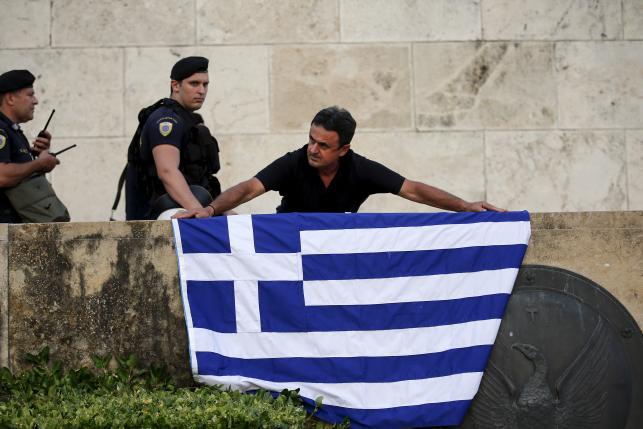IMF calls for Greece debt relief as Germany talks tough

ATHENS/BRUSSELS – A secret International Monetary Fund study showed Greece needs far more debt relief than European governments have been willing to contemplate so far, as Germany heaped pressure on Athens on Tuesday to reform and win back its partners' trust.
The IMF's stark warning on Athens' debt was leaked as Greek Prime Minister Alexis Tsipras struggled to persuade deeply unhappy leftist lawmakers to vote for a package of austerity measures and liberal economic reforms to secure a new bailout.
The study, seen by Reuters, said European countries would have to give Greece a 30-year grace period on servicing all its European debt, including new loans, and a dramatic maturity extension. Or else they must make annual transfers to the Greek budget or accept "deep upfront haircuts" on existing loans.
The Debt Sustainability Analysis is likely to sharpen fierce debate in Germany about whether to lend Greece yet more money, while it will be seen by many in Greece as a vindication of the government's plea for sweeping debt relief. A Greek newspaper called the report a slap in the face for Berlin.
German Finance Minister Wolfgang Schaeuble made clear in Brussels on Tuesday that some members of the Berlin government think it would make more sense for Athens to leave the euro zone temporarily rather than take another bailout.
The Greek Finance Ministry said it had submitted the legislation required by a deal Tsipras reached with euro zone partners on Monday to parliament for a vote on Wednesday.
Assuming Athens fulfils its end of the bargain this week by enacting a swathe of painful measures, the German parliament is due to meet in a special session on Friday to debate whether to authorize the government to open new loan negotiations.
"The dramatic deterioration in debt sustainability points to the need for debt relief on a scale that would need to go well beyond what has been under consideration to date - and what has been proposed by the ESM," the IMF said, referring to the European Stability Mechanism bailout fund.
An EU source said euro zone finance ministers and leaders had been aware of the confidential IMF figures when they agreed on Monday on a roadmap to a third bailout.
IMF Managing-Director Christine Lagarde was present but the IMF did not make the updated assessment public, in contrast to a previous study which was released in Washington on July 2.
PURGE AFTER VOTE?
Lawmakers from Greece's ruling Syriza party and their allies argued behind closed doors about whether to back sweeping reforms the government must ram through parliament as it races to meet the terms of the unpopular bailout deal.
Having staved off financial meltdown, Tsipras has until Wednesday night to pass measures tougher than those rejected in a referendum days ago. With mutiny among hardliners in his own ranks, Tsipras will likely need the support of pro-European opposition parties to carry the vote.
A Greek government official ruled out the possibility that Tsipras might resign, adding that the prime minister would probably purge the cabinet after the parliament vote.
Syriza and its right-wing nationalist junior coalition ally held separate meetings to prepare for parliament sittings to pass the laws, which include plans for tax hikes, pension reforms and tighter supervision of the government's finances.
It was a spectacular turnaround for a Syriza party voted into power in January promising to end years of cuts and recession in a country where one in four people is unemployed.
In Germany, the biggest contributor to euro zone bailouts, doubts linger about whether Tsipras will stick to his word.
"There are many people, including in the federal government, who are quite convinced that in the interests of Greece and the Greek people that what we wrote down would have been much the better solution," Schaeuble said when asked about a German proposal on a "time-out" for Greece from the euro zone. –Reuters







